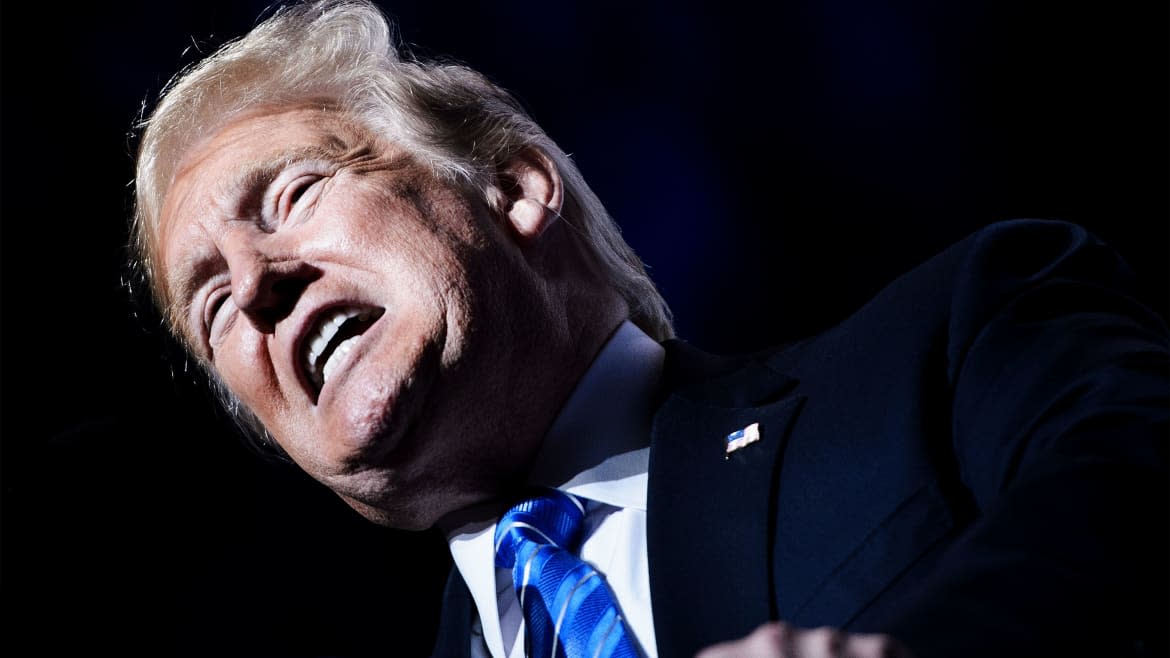Trump’s Foreign ‘Policy’ Is Just Bullying and Bloviating

The starting point for understanding President Donald Trump’s doctrine is his long-standing hostility toward foreign commitments. Unlike George W. Bush and Barack Obama, he is not an “internationalist” who believes that America has a special role in protecting the international order or maintaining international institutions. In Trump’s view, there are few—if any—advantages that America has gained from doing so.
As early as 1987, when he briefly—and for the first time—considered running for president, he took out full-page advertisements in which he complained about foreign countries making “huge profits” while America was protecting their access to international trade routes. He demanded: “Make Japan, Saudi-Arabia and other pay… ‘Tax’ these wealthy nations, not America.” Nearly thirty years later, he applied the same principle to countering terrorism. In early 2016, he told foreign policy experts that America should always help countries that are “threatened by the rise of radical Islam,” but added, “This has to be a two-way street. They must also be good to us.”
Donald Trump’s Wildcat Foreign Policy Is Killing the State Department
Not surprisingly, Trump has been skeptical of ideas like “nation-building” or “democracy promotion” through which other presidents have sought to remake the world in America’s image. But it would be wrong to conclude that this made him a “dove.” His strategic thinking—if it can be described as such—is strongly rooted in the notion of “an eye for an eye.” Trump believes that enemies need to be crushed, and that military power is the rawest, most immediate expression of American strength. With few exceptions, he has supported American wars and interventions, as long as their purpose was clear and they involved no major military, political, or financial commitments.
This has also guided his thinking about terrorism. Other than his views on Islam and immigration, he has never articulated a theory on how people become radicalized or shown any interest in the conflicts or underlying issues that have empowered jihadist groups. His ideas on fighting terrorism are almost entirely coercive, and typically revolve around killing terrorists and showing strength, which he believes is the only way of gaining an opponent’s respect. The academic Stephen Walt has described this aspect of Trump’s doctrine as “Cheneyism”—a reference to the often “crude and bellicose” views of Bush’s vice president, Dick Cheney.
One of the core elements of Trump’s doctrine has been military aggression. In the years following the September 11 attacks, he routinely called on Bush to be tougher and more decisive: “Whatever happened to [General] Douglas McArthur,” he asked in 2003, “He would go and attack. He wouldn’t talk.” Twelve years later, he applied the same criticism to Obama. According to Trump, the conflict with Islamic State required a quick “military solution,” which the president was failing to deliver. In November 2015, he claimed that “we are not bombing,” despite American forces having bombed the group’s territory for over a year.
Throughout the election campaign, he rarely mentioned the need for a political settlement in Syria and Iraq, and never expressed any concern about “collateral damage.” Instead, he constantly demanded that the military be deployed more forcefully. In Trump’s mind, “bombing the shit out of them” was not the first stage of a more sophisticated plan—it was the plan: “You should be killing people,” he reportedly told his generals in a meeting about Afghanistan, “You don’t need a strategy to kill people.”
While Trump’s foreign policy may have sounded “tough,” it has made conflicts more likely and efforts to counter terrorism less effective. The hollowing out of the State Department, combined with Trump’s idiosyncrasies and the empowerment of “know-nothings,” such as Steve Bannon and Jared Kushner, has left America incapable of pulling off foreign “deals,” allowed partners like Saudi Arabia to take advantage, and undermined America’s “exceptionalism.” Far from being “respected,” there is little in Trump’s foreign policy that has lived up to the promise of “making America great again.” If anything, it has systematically eroded the structures and foundations on which American power, global leadership, and security had been built.
In the Middle East, the greatest risk is for America to be drawn into a direct military confrontation with Iran. With Israel, Saudi Arabia and other (Sunni) Gulf states urging Trump to take a more confrontational stance, and “Iran hawks” like Mike Pompeo and John Bolton, Gen. H.R. McMaster’s successor as National Security Adviser, advocating what, in practice, amounted to a policy of “regime change,” it has become harder for an inexperienced and administratively weak administration such as Trump’s to withstand the resulting pressures—or even anticipate the consequences of its own actions. In the words of Marc Lynch, a Middle East scholar at George Washington University:
[Can people like Trump and Kushner] control all of this and keep it contained? Have they thought through the potential Iranian counter-measures? Have they thought through whether their international allies, the Europeans, will be on board? What will the Russians do? I don’t get any real sense that they have done any of these things… I have zero confidence in the ability of the administration to maintain a coherent plan. Or to manage the fallout of all of this. They are in way over their heads.
While Trump may be sincere in wanting to reduce America’s military commitments, one of the (unintended) consequences of his approach is to make a larger, region-wide conflict, with heightened sectarian tensions and the mobilization of jihadist proxies on all sides, more likely.
From Bluster: Donald Trump’s War on Terror by Peter R. Neumann. Copyright © 2020 by Peter R. Neumann and published by Oxford University Press. All rights reserved.
Get our top stories in your inbox every day. Sign up now!
Daily Beast Membership: Beast Inside goes deeper on the stories that matter to you. Learn more.

